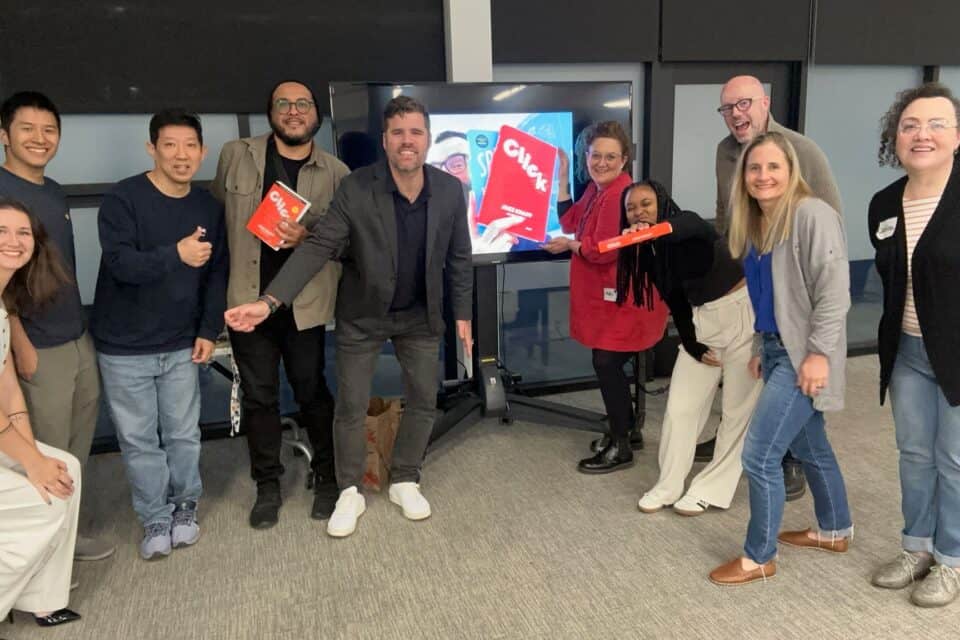How You Might Be Squandering Your Room Intelligence and What To Do About It.
How many webinars have you been invited to lately? It seems like everyone in the world is flooding the internet with talks, seminars, and virtual happy hours. Since the explosion of the COVID-19 pandemic across the globe has forced people in many locations to remain at home 24-7 with shelter-in-place mandates, there’s been a scramble to adapt live in-person events to the new virtual reality.

Webinars have become the default format of choice for online events. They’re relatively quick and easy for anyone to put together, and at first glance, they appear to fulfill the timely need for people to connect and learn remotely.
Maybe you are even thinking of holding one yourself. This is why you shouldn’t.
THE HARSH REALITY
Webinars are like Infomercials

You might remember infomercials from their heyday on broadcast TV. Originating in the late 1970s/early 80s, they were filmed on shoestring budgets and initially shown at times when TV stations would normally be off the air.
Products like Ginsu knives and the Clapper were pitched by a hard sell, anonymous voice-over, and capitalized on offering low-cost, novel goods that seemed too good to be true. These were an irresistible deal to impulse buyers who could simply call up a 1-800 number and order on the spot. Later infomercials in this vein made minor celebrities out of their pitchmen (often former comedians), now in front of the camera–like Vince Offer, who became known for hawking several product lines he owned, including ShamWow! Absorbent towels.
Infomercials evolved to longer formats in the 1990s. While some of these ads were fairly innocuous, many played on the insecurities and vulnerabilities of viewers. There was always an agenda at work, lurking behind the informational facade. That agenda was to sell you on a product or service. The experts and celebrities were paid, endorsers. The audience members were shills, asking questions that reinforced the sponsor’s message.
There’s nothing wrong with simply selling something, but like infomercials, webinars seem to promise more. If what people really need at this point in time is connection and engagement, once they sit through one webinar, they are going to think twice about showing up to passively watch yet another commercial.
Webinars are a One-Way Street
It may seem straightforward enough to put a compelling deck together and talk through the points online as you would in a live event. But in-person events have the advantage of the energy that only a crowd of people gathering in one place can bring. When done well, you draw deep understanding by reading the room and often experience truly unexpected results. We take this for granted and assume the same magic will happen online.
If you’re just a talking head to more-or-less anonymous viewers tuning in to a webinar, not only are they not effectively engaged, but you’re not connecting with them. You have little hope of actually learning anything from them. Either they’re going to buy your pitch or they won’t…but it’s going to be very difficult to draw any other nuanced insights from a webinar full of people you know, much less strangers.
Webinars have a False Sense of Urgency
Blame it on the Netflix Effect. In the past, the only way you could see a movie was to go to a movie theater. There was a limited time that movies played, so there was a sense of urgency to see a film before it was gone. If you missed it, too bad.

Now, movies can be streamed any time of the day or night. People have all kinds of media and information at their fingertips, and they expect to be able to access that content when and how they want.
Webinars imitate the sense of urgency that movies once had by being limited-time events. In this time of widespread isolation, people want to connect. But the typical information in a webinar is something that could just as easily be in a blog post, video, or downloadable PDF. And let us not forget that webinars are often pre-recorded. As people become more choosy about what online events they show up for, they’re going to increasingly disconnect unless the events offer live, meaningful interactions and the potential for emergent qualities.
THE ALTERNATIVE
The Future Is Now
While many companies have resisted allowing their employees to work from home, the current situation has forced them to reverse that position practically overnight. In some cases, it’s a matter of survival, as companies scale back their office spaces and other workplace amenities to remain solvent.

Now that the genie is out of the bottle, the smarter companies are learning that remote workers who have job flexibility and a better life-work balance are far more engaged, enthusiastic, and positive. This significantly increases their productivity and the likelihood they will remain with a company.
No matter how long quarantines and social distancing lasts, the shift to remote work is a permanent change that will define the business landscape of the future.
Virtual Workshop > Zoom Call
The ability to lead people in effective online workshops is going to be a huge competitive advantage going forward.

But it’s not going to be enough to turn on the webcam and hope for the best. With all the digital tools available now–from video conferencing to team management and even graphical workplace simulators–it’s tempting to think that a successful virtual workshop is as easy as plugging the right apps into your established workflow and carrying on as usual; that’s not the case. Things look very different when you’re staring at a crowd of poorly-lit faces, individually isolated in their ad-hoc home office spaces.
Aside from the obvious problems of helping people feel connected in a disorienting situation, effective methods used with in-person workshops, like Liberating Structures, need to be adapted and tweaked to work in a remote context. To be sure, creating truly effective virtual workshops is a challenge, but the potential of remote work is clear. Virtual workshops are places where real work can get done.
Together, We Are A Workshop
In the past, a top-down managerial hierarchy may have been the quickest path to success, with an authority at the top of the pyramid disseminating wisdom and process down the chain of command. For today’s challenges, it’s often those from outside the inner circle, people who have not traditionally had a seat at the table, that are the drivers of innovation.

Those who have not previously felt welcomed into the conversation need to be empowered to introduce new ideas and perspectives. Genuine empathy and transparency need to be incorporated into both the technologies and methods that are used to facilitate online work.
Solidifying relationships and engendering trust, particularly in uncertain times, is critical. If you take the time and effort to construct an engaging online workshop, you will get the right people to the (virtual) table. An effective workshop will build lasting connections.
THE WAY FORWARD

We’re being presented with a unique opportunity in this period of time to break entrenched procedures, bring new voices into the conversation, create more efficient and rewarding work processes, and introduce game-changing ideas to the world.
There are big problems to be solved. Why not build something together?
Want to learn more about virtual facilitation?
Voltage Control offers virtual services including Virtual Facilitation, Virtual Transitions, and Virtual Meeting Design. Please reach out at info@voltagecontrol.com for a consultation.




